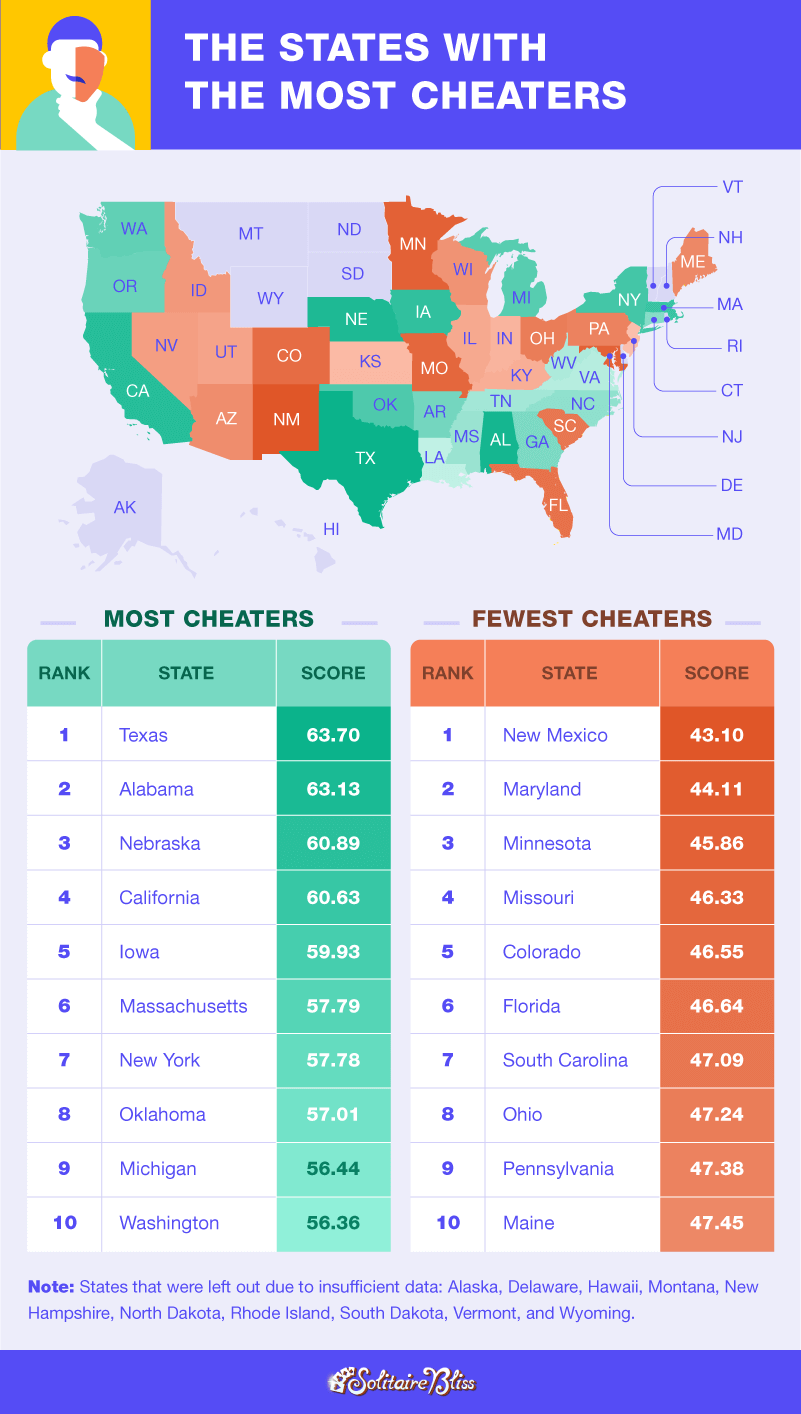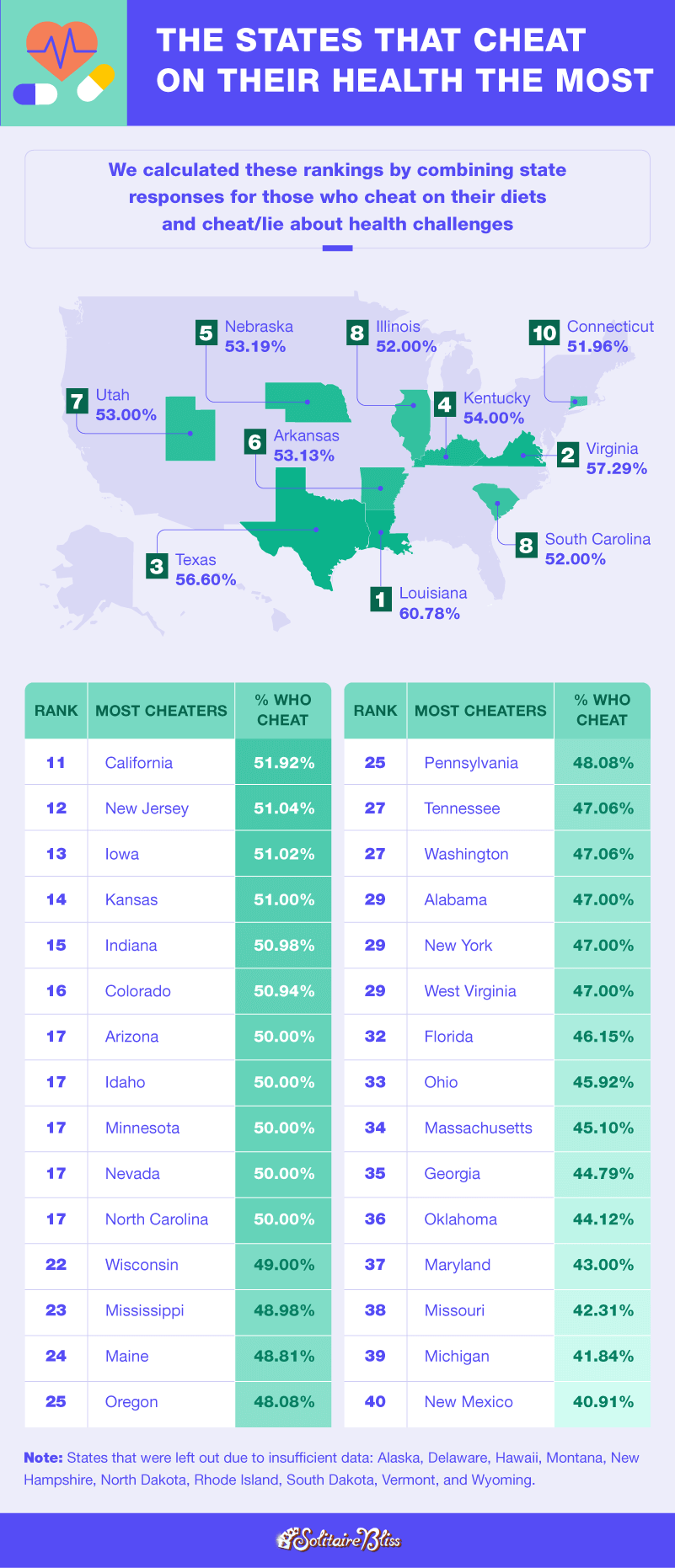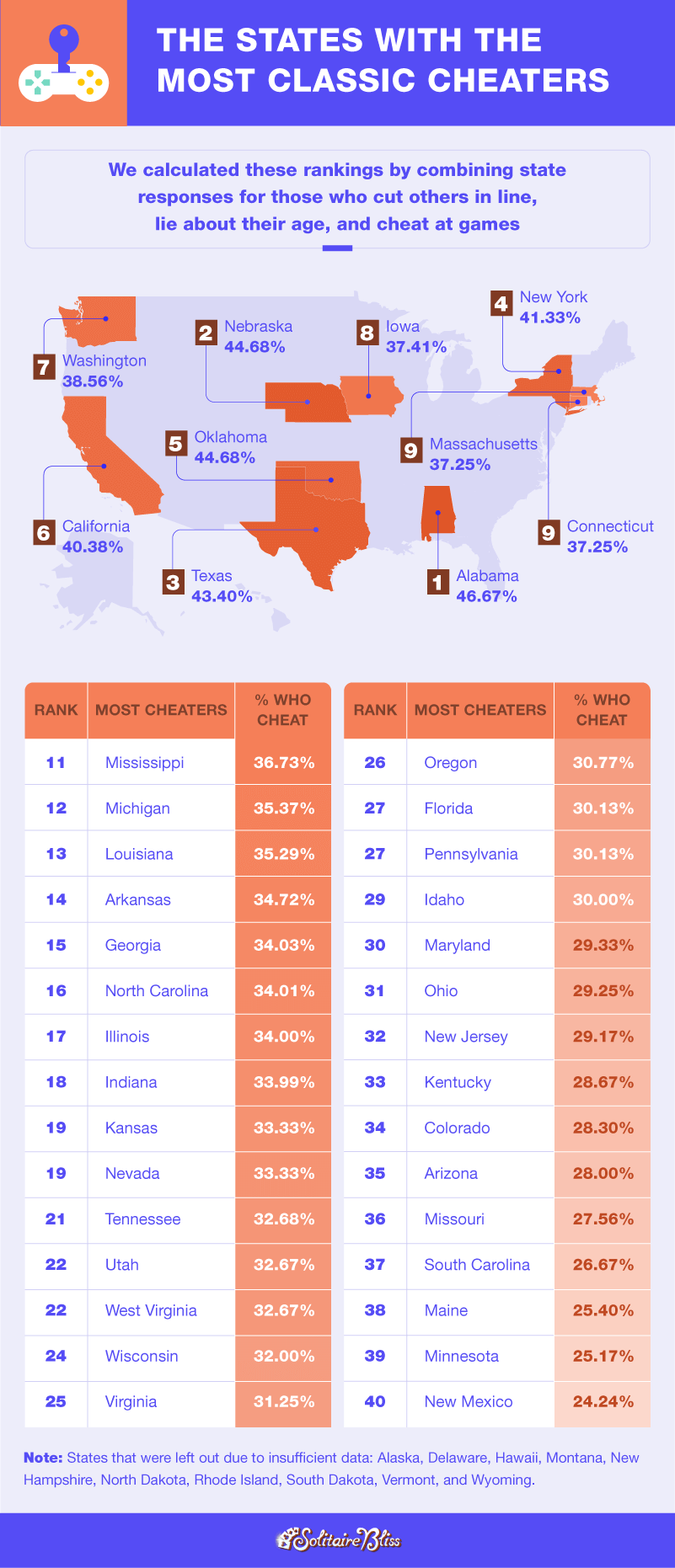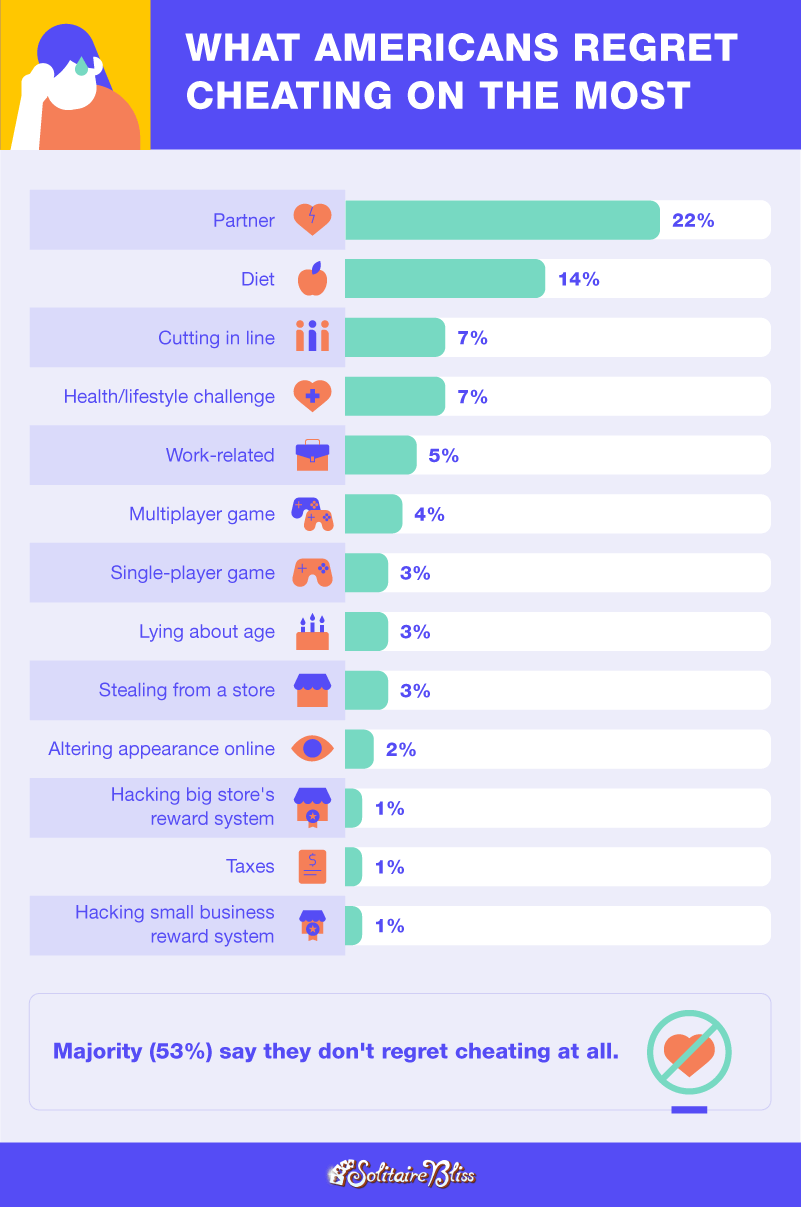These U.S. States Have the Most Cheaters

From fudging your work hours to straying from the rules of a diet, opportunities for dishonesty seem to lurk around every corner. Whether it’s because of a short attention span, peer pressure, or even a competitive nature, people cheat all the time. Even with our solitaire game, we’ve noticed people use tricks to improve their scores.
We were curious how frequently people cheat and what they cheat the most on, so we conducted a survey to determine where in America people cheat the most. In our survey, we asked nearly 2,000 individuals about the myriad of ways they might cheat in their adult lives. Who are the biggest culprits, and which states house the most honest citizens? Let's dive in and uncover the truth about America's cheating habits.
Key Findings
- Texas, Alabama, and Nebraska are home to the most cheaters.
- New Mexico, Maryland, and Minnesota have the most honest citizens.
- The most common ways Americans cheat is on their diets (72%), single-player games (44%), and cutting others in line (39%).
- Majority of cheaters (53%) say they don't regret cheating at all.
Texas Is Home to the Most Cheaters
The art of deception manifests differently across various aspects of American life. A staggering 72% of Americans confess to straying from their diets, perhaps revealing a national struggle with temptation. Single-player games, a realm where the only victim of deceit is yourself, sees 44% of individuals bending the rules. Meanwhile, 39% admit to the occasional urge to skip ahead in line, revealing a subtle societal impatience.
However, as much as we find these lighter transgressions intriguing, it’s heartening to note the activities Americans tend to steer clear of. For instance, only 4% have tampered with a small business’ reward system, such as adding extra punches to their loyalty cards. A slightly higher 10% have fudged their deductions on their taxes, while 23% have indulged in minor theft from stores like not scanning an item at self-checkout or nibbling on bulk candies before they’re weighed and paid for.
While these statistics provide a national overview, shifting into state-specific data paints a more nuanced picture. Texas, topping the list with a cheating score of 63.70, sees 51% of its residents sneaking ahead in lines and 45% admitting to workplace deceits.
Alabama, just a hair behind, boasts the highest percentage of diet cheaters at a whopping 76%. Nebraska, however, takes the crown for workplace and line-cutting cheats, both at 55%. Meanwhile, Californians with a score of 60.63, cheat on their diets about as much as the national average but are slightly more honest when standing in line. Lastly, Iowa stands out as the leading state for relationship and multiplayer game infidelities.
While the reasons and methods of cheating vary wildly from state to state and activity to activity, these statistics offer a fascinating snapshot of human behavior, temptation, and the bending of rules.

Truth Blooms in the New Mexico Desert
In an era of half-truths and blurred lines, some states stand as beacons of honesty. At the forefront is New Mexico with a score of 43.10. The state has residents least likely to cheat on health challenges and multiplayer games, standing at just 16% for both. Moreover, only a quarter of New Mexicans admit to lying about their age or cutting corners at work. Their commitment to integrity is further highlighted by a mere 5% fudging numbers on their taxes.
Maryland trails closely, with a cheating score of only 44.11. Marylanders hold the moral high ground especially when it comes to not cutting in line or cheating on partners, placing them amongst the least likely in the nation to commit these transgressions.
Minnesota’s residents, with a score of 45.86, are remarkably candid about their age — only 18% have ever lied about it. Furthermore, their workplaces seem to foster some honesty, as just 29% admit to work-related deceptions like clocking extra hours or taking credit for someone else’s work.
Missouri and Colorado round out our top five most truthful states, both scoring in the mid-40s. While Missouri’s residents tend to be more honest about their age, with only 23% lying about it, Coloradans display impressive workplace integrity (21%). However, it’s worth noting that Colorado breaks away from the pack slightly with 15% admitting to manipulating their taxes, placing it as a top state in this particular metric.
While temptations persist everywhere, it’s invigorating to see states like these setting examples of honesty and integrity across various facets of everyday life.
Louisiana Is Guiltiest of Health-Related Cheating
Navigating health challenges, like Dry January or the 75 Hard, is a shared American experience, and, interestingly, a venue for deception. While 1 in 4 Americans admit to bending the rules in health challenges, dietary commitments emerge as the most popular “bendable” venture with 72% confessing to a dietary slip.
Diving into the demographics, women, at 28%, are slightly more inclined than their male counterparts (25%) to dodge health challenges. Generational trends provide another lens of intrigue: Both boomers and Gen X stand united at a 75% cheat rate on diets. Millennials don’t lag far behind, with 74% admitting to dietary cheats, while Gen Z, perhaps instilled with a different brand of discipline, shows a significant drop with only 55% bending dietary rules.
Regional variances, too, paint an intricate picture of health honesty. Louisiana, Virginia, and Texas lead the chart with 60.78%, 57.29%, and 56.60% respectively, showcasing higher instances of health-challenge cheating. Conversely, states like New Mexico and Michigan emerge as health exemplars with only 40.91% and 41.84% admitting to any form of deception.

2 in 5 American Adults Have Cut Someone in Line
The subtle art of “line cutting” is perhaps the oldest trick in the book of everyday cheats. This classic act has seen its fair share of culprits, with nearly 2 in 5 Americans having confessed to indulging in this sneaky behavior as adults.
It’s the younger generations, with Gen Z at 44% and millennials at 40%, who are most inclined to this mischief, compared to a more patient 28% of boomers. Gen X falls somewhere in the middle at 39%. Interestingly, men (42%) seem to find the lure of a shorter wait slightly more tempting than women (36%).
Age, however, isn’t just a number when there’s an opportunity to bend a rule. We found that 35% of Americans admit to shaving off or adding on years when restrictions apply. Here again, Gen Z, possibly keen to fast-forward into adulthood, leads the pack with 56% having lied about their age. This trend gradually diminishes with age, with boomers only 30% likely to feign their years. Millennials and Gen X are tied at 32% in this metric.
As we navigate to the virtual realm of multiplayer games, the spirit of competition sometimes leads to rule bending. A noteworthy 27% of Americans have taken shortcuts in such games. Gen Z gamers, at 40%, seem most prone to gaming transgressions, followed by millennials (32%), Gen X (20%), and boomers (12%).

People Mostly Regret Cheating on Their Partners
Cheating, in its many forms, often comes with a side of remorse — or so one might think. In fact, the majority of Americans (53%) claim they carry no regrets after bending the rules. Dive a bit deeper and we find that men are slightly more nonchalant about their transgressions, with 55% expressing no remorse compared to 49% of women.
However, when the pangs of guilt do strike, they’re most acute in certain areas. Cheating on partners tops the list, but only at a relatively modest 22%. Following closely is the ever-challenging domain of diets, where 14% rue their lapse in dietary discipline. What’s particularly amusing, if not a touch endearing, is that 7% feel the sting of guilt after sneaking ahead of others in line.

Conclusion
Cheating may seem like a tempting shortcut, much like the varied ways one can sidestep rules in games. But just like in the game of Spider Solitaire, where each move is a testament to one's patience and strategy, life, too, demands a similar approach. Games like Spider Solitaire and FreeCell rely not on external accolades, but personal satisfaction.
Solitaire relies not on external accolades, but on personal satisfaction. There’s no opponent to deceive, only oneself. Similarly, when faced with the various temptations to cheat in real life, perhaps we ought to remember the essence of Solitaire: The true victory lies not in the quick win, but in the integrity of the game played.
Methodology
We established a series of survey questions that focused on cheating behaviors. We scored each state on these questions to determine a score out of 100. From there, we analyzed the numbers by state and ranked them accordingly.
We surveyed 1,992 Americans from August 28 to September 5, 2023. Respondents ranged in age from 18 to 76 years old, and were 49% female, 49% male, and 2% nonbinary.
States that were left out of our ranking due to insufficient data were Alaska, Delaware, Hawaii, Montana, New Hampshire, North Dakota, Rhode Island, South Dakota, Vermont, and Wyoming.
Back to the Homepage

